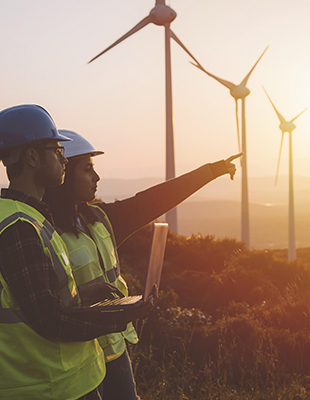Keeping the 1.5 ˚C temperature goal alive is the mission of COP26 in Glasgow, according to its President Alok Sharma. But how can this be achieved in practice, and what role will COP26 play in accelerating change?
According to the latest summary of the science released by the IPCC (Intergovernmental Panel on Climate Change), climate change is widespread, rapid and intensifying, and time is running out before these changes become locked into the climate system. To help keep the target of limiting global warming to 1.5 ˚C in play, the IPCC report highlights that it is essential that we cut global emissions in half by 2030 and reach ‘net zero’ by 2050.
The time to act is now and COP26 aims to build real global political momentum to deliver on the following key objectives:
- Accelerate emission reductions for a 1.5˚C pathway by increasing reliance on renewable energy and phasing out fossil fuels, curtailing deforestation and accelerating the move to zero-carbon transport.
- Adapt and build resilience to avert, minimise and address the loss and damage that is affecting communities and natural habitats.
- Mobilise climate finance to support the transition in developing countries and unleash all forms of finance to power the shift to a zero-carbon economy.
What does it mean for each one of us?
After the 2015 Paris Agreement, COP26 presents a huge opportunity to bring in climate change to mainstream politics, raise public consciousness and inspire climate action. At COP26, governments, businesses, cities, scientists and civil society will work together to finalise plans to curb emissions, deal with the impacts of climate change and accelerate the transformation of the world economy.
Policymakers will need to demonstrate what they are doing to reduce climate change and accelerate the shift to a low-carbon, more inclusive society. Delivering net zero will need to be placed at the forefront of all decision-making. The implications for each one of us are vast. Our ways of life will transform, what we eat and consume, how we learn and the skills we use, how we move and where we live. To secure a just transition to a low carbon economy, we, people and communities will need to be fully engaged with the process.
What does it mean for Arcadis, our clients and our industry?
At Arcadis, we are working to understand the implications that this fundamental shift will have on the industry.
As a member of the World Business Council for Sustainable Development, we are committed to Vision 2050 where all buildings have net-zero operational carbon emissions, where the carbon footprint of buildings (embodied carbon) has also been reduced to zero and where climate resilience is a key consideration in infrastructure planning.
In our Global Sustainability Strategy 2021-2023 we have committed that by 2023 we will not engage in projects that have a net, long-term negative impact on quality of life or the advancement of the Sustainable Development Goals.
COP26 has real potential to accelerate behavioural change and shifts in technology and innovation.
It will:
1. Provide confirmation where policies may be heading as new political deals are struck on energy, transport, and nature. In the UK, we are looking forward to the final report of the Treasury Net Zero Carbon Review over the next few weeks.
“The built environment is fundamental to many of the themes of COP26. At Arcadis, we are committed to take every opportunity to limit emissions and work across our sector to not only find Net Zero options but to continually innovate, drive down the cost, and scale those solutions around the world. We recognise that tackling inequality and creating shared prosperity for all must be at the heart of our agenda for sustainable growth.”
Ben HarrisSustainability & Climate Change Director
2. Help mobilise green finance to support the whole-economy transition to net zero. We are in the midst of a global revolution in sustainable debt markets, green finance instruments and financial regulation, helping to fuel the push to ‘build back better’.
Additional levels of capital finance will be channelled into every sector. Growing ESG pressure is making it increasingly important for net zero carbon to be prioritised in all activities, and we are seeing more demand for the assessment and measurement of climate-related risks and opportunities across all asset portfolios. We have a critical role to play in making projects and programmes investable and deliverable.
3. Anticipate and respond to shifts in behaviours and expectations of our clients and their customers. Across the public and private sector, businesses, organisations and local authorities are all considering how to respond to the climate emergency.
For us, this means a commitment to making sustainability a part of every project, every bid, and every client engagement and a demonstrable aspect of all our technical and advisory solutions.
4. Brings about more innovation and new business models. COP26 can help create irresistible momentum in the development and delivery of the technologies and behavioural changes needed to transform our chances of averting the climate emergency.
This will reshape our markets as assets get revalued, new services and products get incentivised and new productive technologies substitute carbon-intensive ones. Agility is key. At Arcadis, we are constantly looking for new ways to use our deep knowledge of markets, technical expertise, and digital tools to help our clients unlock the full potential of their sustainability efforts.
Ahead of COP26, the IPCC report signals “code red for humanity”.
The time to act is now.
At Arcadis, we are ready to play our part and lead this transition. Are you?






